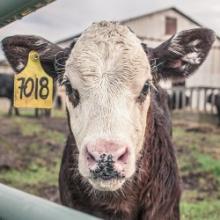Tuberculosis (TB)
 |
Tuberculosis (TB) is an infectious disease caused by strains of bacteria known as mycobacteria. The disease most commonly affects the lungs and can be fatal if not treated. However, most infected individuals show no disease symptoms. One third of the world’s population is thought to have been infected with TB. TB kills nearly 4,500 people every day, and 10 million became ill with TB in 2017. Bovine TB in animals was reported by nearly half of the 179 countries who reported their bovine TB status to OIE, 2015-16. As well as harming animal health, it can be hugely damaging for farmers whose livestock and livelihoods are affected. Furthermore bovine TB is zoonotic, and the WHO has estimated 12,500 people died due to M. Bovis TB in 2017*.*WHO Global Tuberculosis Report 2019, Table 3.4 p38. |
Cambridge groups and their work on Tuberculosis (TB)
Ramakrishnan Group (Department of Medicine)
Led by Professor Lalita Ramakrishnan, the Ramakrishnan Group study the pathogenesis of tuberculosis using zebrafish. The fish are susceptible to tuberculosis caused by a bacteria very similar to the bacteria that causes tuberculosis in humans. Watch Professor Ramakrishnan discuss the research in a video from the Wellcome Trust.
The Abell Group (Department of Chemistry)
Professor Chris Abell’s Group use fragment-based approaches to understand of the role of cytochrome P450 enzymes (CYPs) from Mycobacterium tuberculosis. Read more about Abell Group’s work on TB.
The Floto Lab (Department of Medicine)
Professor Andres Floto’s Lab look at defining the critical molecular pathways that restrict intracellular bacterial growth. Find out more about the Floto Lab’s work on tuberculosis.
Cambridge-Chennai Centre Partnership on Antimicrobial Resistant Tuberculosis (Department of Medicine)
In 2015 the University of Cambridge was awarded £2 million from the UK Medical Research Council and the Government of India’s Department for Biotechnology to develop a partnership with the National Institute for Research in Tuberculosis (NIRT) in Chennai. The project include University of Cambridge Professors Sharon Peacock, Lalita Ramakrishnan, Ken Smith, Tom Blundell and Andres Floto. Find out more about the partnership.
Ethicobots: Ethiopia Control of Bovine Tuberculosis Strategies (Department of Veterinary Medicine)
Ethicobots is a 5 year research project awarded to a consortium of researchers from Ethiopia and the UK, led by the University of Cambridge. It aims to tackle the high burden of bovine TB in the Ethiopian dairy farm sector and to investigate the consequences of the on-going centrifugal trade of potentially infected dairy cattle to low prevalence regions and farming systems on transmission. Find out the latest news from the Ethicobots project.

